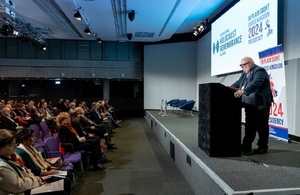International Holocaust Remembrance Alliance: London Plenary
The UK hosted a successful plenary meeting of the International Holocaust Remembrance Alliance on 2 - 5 December 2024, the second plenary held during the UK’s presidency.

IHRA Chair Lord Pickles addresses delegates at the plenary.
On 2 – 5 December, the UK, as chair of the International Holocaust Remembrance Alliance (IHRA), hosted its second IHRA plenary meeting in London. Delegates from the IHRA’s 35 member countries, observer countries and international partners gathered to discuss issues around Holocaust remembrance, education and research, under the UK presidency’s theme - ‘In Plain Sight’. This followed a successful IHRA plenary in Glasgow earlier this year. The global rise in antisemitism set the scene for discussions, with delegates sharing their experiences and highlighting the importance of education and IHRA tools in tackling this growing challenge.
During the plenary, the UK presidency was delighted to showcase work undertaken by several schools across IHRA member states to learn about the Holocaust in their local area. This was part of our flagship presidency project ‘My Hometown’. Projects ranged from learning about the history of the local Jewish community and historical Jewish sites, to visiting former concentration camps and meeting Holocaust survivors. Schools presented their work in creative ways, including through film, music and art. See gallery of all the projects on our project implementer’s website.
The UK was also pleased to support the launch of the new UK Holocaust testimony portal, developed by the Association of Jewish Refugees (AJR). First announced at the UK Holocaust Testimony Conference, co-hosted by the FCDO and AJR in April 2023, the portal brings together testimony from UK-based Holocaust survivors and refugees, allowing users to access a wide range of UK testimony on one platform for the first time.
One of the UK presidency’s priorities has been a focus on the role of emerging technologies as a force for both good and bad in Holocaust education and distortion. Building on a successful event co-sponsored by the UK and the OSCE, in Romania in October, which explored the role of artificial intelligence in Holocaust distortion and education, the UK hosted a one-day side conference on 1 December. The event brought together experts on artificial intelligence and Holocaust remembrance, to discuss the challenges and opportunities presented by emerging technologies.
The UK also hosted a one-day side conference on the “Persecution and Genocide of the Roma during the Nazi era”, with a focus on the need to raise awareness and understanding of Roma agency and action during the Nazi period of persecution and in the post-war period in Europe. During the conference, we publicly launched the IHRA’s “Recommendations for Teaching and Learning about the Genocide of the Roma”, which aim to enhance teachers’ ability and confidence in teaching about the history of the Roma and its continued relevance today.
The UK presidency also proudly launched “80 objects – 80 Lives” – a series of short videos, in which Holocaust survivors share personal stories connected to their possessions. Over the coming weeks, these videos will be published online in the run up to the 80th anniversary of the liberation of Auschwitz-Birkenau in January 2025.
Sadly, we will soon reach a point when the Holocaust will no longer be in our living memory. But the lessons from this dark period in history have never been more relevant. We must continue to remember the six million Jewish men, women and children who were murdered during the Holocaust, and do all we can to strengthen, advance and promote Holocaust education, research and remembrance worldwide.